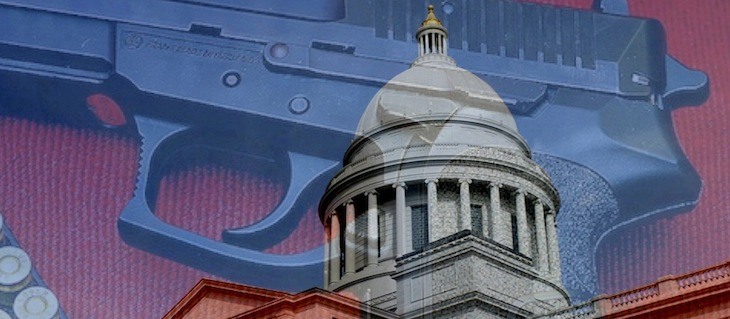Law bans gun sales to medical marijuana users, but will it be enforced?
by November 19, 2018 7:54 pm 18,362 views

There have been 6,428 Arkansans who’ve been approved for medical marijuana cards, and if the state’s cultivators and dispensaries were in operation, those card holders could purchase the drug now.
They wouldn’t, however, be able to purchase firearms legally from a federally licensed gun dealer because marijuana is still a banned controlled substance under federal law. Nor could they legally obtain a firearm from another source.
That’s the law, anyway.
In a memo Sept. 21, 2011, the Bureau of Alcohol, Tobacco and Firearms’ Arthur Herbert, assistant director, Enforcement Programs and Services, wrote that federal law prohibits anyone who is an “unlawful user of or addicted to any controlled substance” from “shipping, transporting, receiving or possessing firearms or ammunition.” Federal law also bans anyone from selling or providing guns or ammunition to people they believe are using the drug.
“Marijuana is listed in the Controlled Substances Act as a Schedule I controlled substance, and there are no exceptions in Federal law for marijuana purportedly used for medicinal purposes, even if such use is sanctioned by State law,” he wrote.
According to the memo, medical marijuana users must answer yes to question 11.e. on the ATF’s Form 4473, the ATF’s Firearms Transaction Record, when purchasing a firearm. That question asks, “Are you an unlawful user of, or addicted to, marijuana or any depressant, stimulant, narcotic drug, or any other controlled substance? Warning: The use or possession of marijuana remains unlawful under Federal law regardless of whether it has been legalized or decriminalized for medicinal or recreational purposes in the state where you reside.”
David Couch, who sponsored the medical marijuana amendment passed by Arkansas voters in 2016, said medical marijuana card holders will be violating federal law if they purchase a firearm.
“Technically, it’s a crime or an enhanced crime to have a gun,” he said. “If you’re a medical marijuana person and you have a medical marijuana card, you go to a gun dealer, you either have to commit perjury or don’t buy a gun.”
So it’s illegal, technically. The question is, how often is it enforced?
Frank Kelsey, the ATF’s deputy chief of public affairs, said nothing has changed since that 2011 memo was written. He said the ATF prosecutes cases where drug users purchase firearms, though he didn’t have any specific cases involving medical marijuana users in a state where such use is legal. Violators are subject to federal prison terms of up to 10 years.
Couch said the Rohrabacher-Blumenauer amendment, sponsored by U.S. Reps. Dana Rohrabacher, R-Calif., and Earl Blumenauer, D-Ore., prohibits the Department of Justice from using federal funds to prosecute individuals who purchased medical marijuana in compliance with state law. It was first approved in 2014 and has been reapproved in following budget deals.
Tom Adams is managing director of the Industry Intelligence Group at BDS Analytics, which analyzes the marijuana industry worldwide. He said the level of federal enforcement has been “absolutely none,” as a result of that amendment, adding that, “There’s no funds to go check one set of records against the other.”
“Because of that, anybody who’s done any research at all and gotten a medical card, even in a pretty conservative state like Arkansas, is kind of aware of the fact that there’s no real threat from the federal government,” he said.
Rep. Doug House, R-North Little Rock, who sponsored much of the marijuana legislation passed in the 2017 Arkansas legislative session, said there is “Nothing the state can do to overrule a federal statute.”
“If a client asked me, a lawyer, I would say never carry if you have a card,” he wrote in a text. “I would also have them write a note ‘gifting’ my guns to my spouse so there would be a weapon in the home, especially out here where I live and it can take 45 minutes for the sheriff to arrive.”
In Arkansas, federal and state authorities will have limited coordination regarding enforcement. The Form 4473s go straight to the Department of Justice. The Arkansas State Police has no role in the process, spokesman Bill Sadler said. The Department of Health is not sharing card applicant information with the federal government, said Meg Mirivel, ADH public information director.
Probably no state is more associated with legalized marijuana use – recreational and medical – than Colorado. Edgar Antillon is owner of Guns for Everyone, a Colorado company that began as an advocacy group and became a training company and federally licensed firearms dealer. He said his company performs background checks but not drug tests. He said he complies with federal law and will not sell a firearm to someone who answers “yes” on Form 4473’s question 11.e. However, he relies on buyers to answer as they choose. He said he hasn’t “experienced somebody telling me that they smoke marijuana while trying to buy a gun.”
Likewise, he doesn’t ask.
“It doesn’t come up,” he said. “I don’t ask them about alcohol or Percocet or heroin or cocaine. I’m not going to ask them about marijuana.”
Moreover, Antillon said federal agents have not been raiding the homes of casual medical marijuana users in Colorado. When it happens, it’s usually because the user has an illegal operation or illegal amount of the drug.
“I personally have not heard of somebody who’s a casual smoker or a recreational smoker have the ATF visit them because of their marijuana use,” he said.
